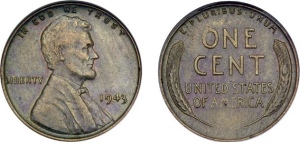
1943 Copper Cent valued at $80,000 Photo credit: commons.wikimedia.org/wiki/
On Saturday March 7, I auditioned for a slot in the cast of Listen to Your Mother—Nashville, an evening of readings of stories in honor of mothers. Since March is National Women’s History Month and today is International Women’s Day, I offer a tease of what I shared: “The Mycophagists,” a recounting of the great mushroom soup insurrection.
Listen to Your Mother
Behold I show you a mystery: it seems to me, that the greater my distance from home, the better I understand my mother’s voice. After sixty years, I can still hear Audrey, my mother, speaking to me: “For a hungry man, no bread is too stale; for a starving man, no soup is too thin. So, drink your soup! Eat your toast!”
The trouble was that in my family we did not willingly eat mushrooms. . . .
Dream or vision?
You will have to be patient to hear the rest. Either hear me perform the piece in person May 2 at the TPAC in Nashville, Tennessee or read it here in my blog, sooner or later. We will shortly know whether my dream will come true.
I mean that statement more than metaphorically. A few years ago I had a vivid dream that I was standing before a group—reading aloud. I gradually recognized the words as my own. I was reading my story, my memoir, the child of my memory and of my childhood. My gaze lifted to look into the eyes of my listeners. I was at Barnes and Noble for a book signing! Perhaps it was a gratuitous wish fulfillment, but perhaps it was actually a vision of what lies ahead. The Lord knows and we shall see.
But the question comes to me as I ponder the future and my compulsion to scribble: why do I tell stories? In the years that I have worked at the craft of teaching and communicating, I have studied and practice the art of the well-turned phrase, of the clearly expressed idea, and of the fresh glimpse of reality. What scientists and professors do in my discipline is exposition and argumentation. Only rarely do we deploy narrative to illustrate our point, and then it is often considered an ornamentation.
Homo narrans
Humans are narrators. Homo narrans, I have heard our species called. We love a story. Oliver Sacks, a consummate story teller as well as clinical neuroscientist, has taught me so much. He has illuminated neuropsychology for us all by his stories of the bizarre and poignant behaviors of his patients in works like The Man who Mistook His Wife for a Hat and many others. Sacks makes the point that the inner self of a human being is his stories and his memories. So I tell stories because they are me, at least in part.
And my stories are gifts, from the hand of the Father, I believe. They are like treasures we pick up along the way. I once was inspired in 2002 to express that thought in verse that I will now inflict upon you, dear reader, as my admonition.
These are Lines Scribbled
These are lines scribbled
with a blue pen
Found on the concrete,
Picked up on the way
To somewhere.
‘Forget where.
Discovered letters, these.
Stumbled-on words
Scratched on an envelope back
Lest they be lost again forever.
They spill out the ball
As if a thing alive,
A skipping, undulating scrawling wave
That carries meaning on its back
Like flotsam or flying fish
In a gray-green sea
That romantics would call blue.
Truth is found like green pennies, too,
On the pavement, snatched up,
That nothing be lost.
Heads—I keep it;
Tails—I give it away.
But never leave it lie.
Someday it might be a copper ’43 Steelie’s twin
Lost somehow ‘til now.
So do pick it up,
Unafraid as you go by,
Gold is where you find it.
Leave a comment